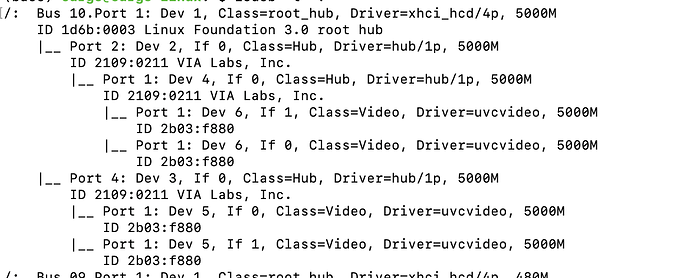/: Bus 10.Port 1: Dev 1, Class=root_hub, Driver=xhci_hcd/4p, 5000M
ID 1d6b:0003 Linux Foundation 3.0 root hub
|__ Port 2: Dev 2, If 0, Class=Hub, Driver=hub/1p, 5000M
ID 2109:0211 VIA Labs, Inc.
|__ Port 1: Dev 4, If 0, Class=Hub, Driver=hub/1p, 5000M
ID 2109:0211 VIA Labs, Inc.
|__ Port 1: Dev 6, If 1, Class=Video, Driver=uvcvideo, 5000M
ID 2b03:f880
|__ Port 1: Dev 6, If 0, Class=Video, Driver=uvcvideo, 5000M
ID 2b03:f880
|__ Port 4: Dev 3, If 0, Class=Hub, Driver=hub/1p, 5000M
ID 2109:0211 VIA Labs, Inc.
|__ Port 1: Dev 5, If 0, Class=Video, Driver=uvcvideo, 5000M
ID 2b03:f880
|__ Port 1: Dev 5, If 1, Class=Video, Driver=uvcvideo, 5000M
ID 2b03:f880
/: Bus 09.Port 1: Dev 1, Class=root_hub, Driver=xhci_hcd/4p, 480M
ID 1d6b:0002 Linux Foundation 2.0 root hub
|__ Port 1: Dev 2, If 0, Class=Video, Driver=uvcvideo, 480M
ID 0ac8:3500 Z-Star Microelectronics Corp.
|__ Port 1: Dev 2, If 1, Class=Video, Driver=uvcvideo, 480M
ID 0ac8:3500 Z-Star Microelectronics Corp.
|__ Port 1: Dev 2, If 2, Class=Audio, Driver=snd-usb-audio, 480M
ID 0ac8:3500 Z-Star Microelectronics Corp.
|__ Port 1: Dev 2, If 3, Class=Audio, Driver=snd-usb-audio, 480M
ID 0ac8:3500 Z-Star Microelectronics Corp.
|__ Port 2: Dev 3, If 0, Class=Hub, Driver=hub/4p, 480M
ID 2109:2211 VIA Labs, Inc.
|__ Port 1: Dev 8, If 0, Class=Hub, Driver=hub/4p, 480M
ID 2109:2211 VIA Labs, Inc.
|__ Port 1: Dev 9, If 0, Class=Hub, Driver=hub/2p, 480M
ID 0424:2512 Microchip Technology, Inc. (formerly SMSC) USB 2.0 Hub
|__ Port 2: Dev 11, If 0, Class=Human Interface Device, Driver=, 12M
ID 2b03:f881
|__ Port 4: Dev 4, If 0, Class=Hub, Driver=hub/4p, 480M
ID 2109:2211 VIA Labs, Inc.
|__ Port 1: Dev 5, If 0, Class=Hub, Driver=hub/2p, 480M
ID 0424:2512 Microchip Technology, Inc. (formerly SMSC) USB 2.0 Hub
|__ Port 2: Dev 7, If 0, Class=Human Interface Device, Driver=, 12M
ID 2b03:f881
/: Bus 08.Port 1: Dev 1, Class=root_hub, Driver=xhci_hcd/4p, 5000M
ID 1d6b:0003 Linux Foundation 3.0 root hub
|__ Port 1: Dev 2, If 0, Class=Hub, Driver=hub/1p, 5000M
ID 2109:0211 VIA Labs, Inc.
|__ Port 1: Dev 4, If 0, Class=Video, Driver=uvcvideo, 5000M
ID 2b03:f880
|__ Port 1: Dev 4, If 1, Class=Video, Driver=uvcvideo, 5000M
ID 2b03:f880
|__ Port 3: Dev 3, If 0, Class=Hub, Driver=hub/1p, 5000M
ID 2109:0211 VIA Labs, Inc.
|__ Port 1: Dev 5, If 0, Class=Video, Driver=uvcvideo, 5000M
ID 2b03:f880
|__ Port 1: Dev 5, If 1, Class=Video, Driver=uvcvideo, 5000M
ID 2b03:f880
/: Bus 07.Port 1: Dev 1, Class=root_hub, Driver=xhci_hcd/1p, 480M
ID 1d6b:0002 Linux Foundation 2.0 root hub
|__ Port 1: Dev 2, If 0, Class=Hub, Driver=hub/4p, 480M
ID 2109:3431 VIA Labs, Inc. Hub
|__ Port 1: Dev 3, If 0, Class=Hub, Driver=hub/4p, 480M
ID 2109:2211 VIA Labs, Inc.
|__ Port 1: Dev 5, If 0, Class=Hub, Driver=hub/2p, 480M
ID 0424:2512 Microchip Technology, Inc. (formerly SMSC) USB 2.0 Hub
|__ Port 2: Dev 6, If 0, Class=Human Interface Device, Driver=usbhid, 12M
ID 2b03:f881
|__ Port 3: Dev 4, If 0, Class=Hub, Driver=hub/4p, 480M
ID 2109:2211 VIA Labs, Inc.
|__ Port 1: Dev 7, If 0, Class=Hub, Driver=hub/2p, 480M
ID 0424:2512 Microchip Technology, Inc. (formerly SMSC) USB 2.0 Hub
|__ Port 2: Dev 8, If 0, Class=Human Interface Device, Driver=, 12M
ID 2b03:f881
/: Bus 06.Port 1: Dev 1, Class=root_hub, Driver=xhci_hcd/4p, 10000M
ID 1d6b:0003 Linux Foundation 3.0 root hub
/: Bus 05.Port 1: Dev 1, Class=root_hub, Driver=xhci_hcd/2p, 480M
ID 1d6b:0002 Linux Foundation 2.0 root hub
/: Bus 04.Port 1: Dev 1, Class=root_hub, Driver=xhci_hcd/2p, 5000M
ID 1d6b:0003 Linux Foundation 3.0 root hub
/: Bus 03.Port 1: Dev 1, Class=root_hub, Driver=xhci_hcd/10p, 480M
ID 1d6b:0002 Linux Foundation 2.0 root hub
|__ Port 1: Dev 2, If 0, Class=Human Interface Device, Driver=usbhid, 12M
ID 062a:4101 MosArt Semiconductor Corp. Wireless Keyboard/Mouse
|__ Port 1: Dev 2, If 1, Class=Human Interface Device, Driver=usbhid, 12M
ID 062a:4101 MosArt Semiconductor Corp. Wireless Keyboard/Mouse
|__ Port 8: Dev 3, If 0, Class=Vendor Specific Class, Driver=pl2303, 12M
ID 067b:2303 Prolific Technology, Inc. PL2303 Serial Port
|__ Port 10: Dev 4, If 0, Class=Mass Storage, Driver=ums-realtek, 480M
ID 0bda:0153 Realtek Semiconductor Corp. 3-in-1 (SD/SDHC/SDXC) Card Reader
/: Bus 02.Port 1: Dev 1, Class=root_hub, Driver=ehci-pci/2p, 480M
ID 1d6b:0002 Linux Foundation 2.0 root hub
|__ Port 1: Dev 2, If 0, Class=Hub, Driver=hub/6p, 480M
ID 8087:8000 Intel Corp.
/: Bus 01.Port 1: Dev 1, Class=root_hub, Driver=ehci-pci/2p, 480M
ID 1d6b:0002 Linux Foundation 2.0 root hub
|__ Port 1: Dev 2, If 0, Class=Hub, Driver=hub/4p, 480M
ID 8087:8008 Intel Corp.

